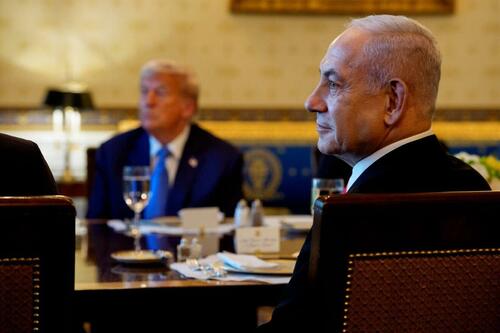
Iran Bats Down Trump’s Claim It Asked For Relaunch Of Nuclear Talks
Washington and Tehran continue their tit-for-tat he said/she said exchanges of statements and accusations, but at least they are not trading ballistic missile attacks at the moment.
Iran on Tuesday clarified that it has not requested talks with the United States over its nuclear program, as claimed by US President Donald Trump during his Monday night dinner hosting Israeli Prime Minister Benjamin Netanyahu. „No request for a meeting has been made on our side to the American side,” Iranian Foreign Ministry spokesman Esmaeil Baghaei was quoted in Tasnim news agency as saying.
 Getty Images
Getty ImagesTrump had told reporters, „We have scheduled Iran talks. They want to talk. They want to work something out. They are very different now than they were two weeks ago.”
The US President appears to be trying to turn the ceasefire into a total 'win’ over Iran’s nuclear program, after lingering questions on if the US bomber raids actually destroyed Tehran’s nuclear capability.
And there was this: „Trump’s Middle East envoy, Steve Witkoff – also present during the dinner – had even said the meeting could take place in the next week or so,” according to Al Jazeera.
Iran’s Foreign Minister Abbas Araghchi has written that „we have good reason to have doubts about further dialogue.” Iran for understandable reasons fears that if it were to come to the negotiating table, it could simply get bombed again while thinking that the other side was dialoguing in good faith.
Below is a fuller explanation of where things stand by Middle East war correspondent Elijah Magnier:
Why the West Knows It Can’t Destroy Iran’s Nuclear Program — but the war was aiming to change the ruling system. The CIA and Mossad never actually intend to destroy Iran’s nuclear or missile programs — because they know they can’t. The deeper truth is this: the real target was the ruling system itself, and that effort has failed. Rafael Grossi, head of the IAEA, revealed he visited nuclear facilities 800 meters underground. No bomb in the U.S. arsenal can reach that depth — not even the GBU-57 bunker buster used by B-2 bombers, which barely penetrates 50–60 meters. The Pentagon wouldn’t bomb Esfahan because it knew the attack would fail. The damage to Fordow, at 100 meters deep, is very uncertain and the US knew it. Iran’s nuclear infrastructure was designed with this in mind.
Centrifuges are not vertically stacked like dominoes. They’re distributed, hardened, and concealed. Enriched uranium has been relocated across multiple undisclosed sites. After the strikes, the West isn’t even sure what was damaged and what survived. But the military campaign was only a small part of the plan. For twelve days, the U.S. and Israel launched a full-spectrum regime-change operation. Intelligence networks, spies and collaborators, embedded over decades — dormant cells, saboteurs, assassins, drone teams — were activated. Assassination plots, confusion campaigns, and targeted destabilisation efforts were unleashed across Iran. This wasn’t covert — it was orchestrated in plain view.
Israeli Prime Minister Benjamin Netanyahu hosted the Iranian crown prince, while media platforms in London and Washington amplified opposition figures. A coordinated information war was waged to fracture public trust, deepen unrest, and break the system from within. It failed. Despite the noise, the Islamic Republic withstood it. The leadership structure held firm. The nuclear program wasn’t crippled. The missile infrastructure remains intact. And the West, after unleashing decades of espionage and psychological warfare, was left with almost nothing to show. That’s why the CIA and Mossad don’t talk seriously about “destroying” Iran’s nuclear capacity anymore. Not because they don’t want to — but because they know they can’t. And their attempt to break the system from within has only proven just how durable that system really is.
To demonstrate just how contradictory Trump policy on the Middle East has been…
Fareed Zakaria and the Aspen Ideas Festival have a big laugh reminiscing about how Trump used to chastise „crazy John Bolton” for desperately wanting to bomb Iran — only for Trump to subsequently bomb Iran pic.twitter.com/We2thdFQDj
— Michael Tracey (@mtracey) July 7, 2025
Despite White House optimism, it’s very unlikely that Iran will come to the nuclear negotiating table at this point. And if it does, there’s a very slim chance of actual progress. Iran has never backed off its insistence that it be allowed to enrich uranium as a matter of national sovereignty.
Tyler Durden
Tue, 07/08/2025 – 15:20


















